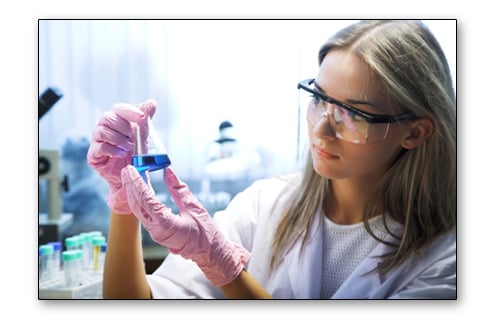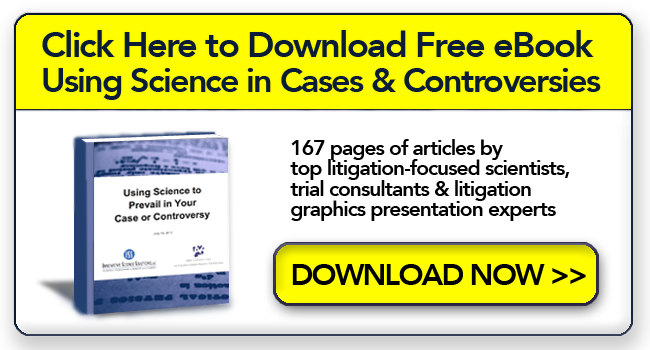by David H. Schwartz
Managing Director, Scientific Support to Counsel,
Innovative Science Solutions
The key to any toxic tort case involving complex scientific concepts is retaining the right experts. However, as any experienced litigator well knows, finding the right expert is not a simple or straightforward matter. Although getting the right lead on a specific individual can be challenging, half the battle is often identifying the right type of expert for your case.
Here are 10 broad expert areas that you should consider for your next toxic tort case. We subdivide each expert area into the relevant sub-disciplines that you should consider.
- Toxicology
In many ways, the toxicologist is the core expert in any toxic tort case. Toxicology is the branch of biology, chemistry, and medicine concerned with the study of the adverse effects of chemicals on living organisms. Like a pharmacologist in a pharmaceutical case, a toxicologist specializes in evaluating adverse health risks posed by chemical exposures.
There are many kinds of toxicologists that should be considered for any toxic tort case. A clinical or medical toxicologist is a physician with a board certification in toxicology. A reproductive toxicologist is an individual (Ph.D. or MD) who specializes in evaluating adverse health effects of chemical exposures on the fetus or offspring. Some toxicologists have particular expertise in evaluating human exposures, while others specialize in assessing animal exposures. Finally, risk assessment toxicologists focus on quantifying and assessing risks from chemical exposures. Retaining the right kind of toxicologist (or multiple toxicologists) for your toxic tort case is critical.
- Epidemiology and Statistics
An epidemiologist specializes in studying exposure-disease relationships, a key factor in achieving a positive outcome in a case. It is rare to see a toxic tort case where there are no published data on the chemicals of interest. A skilled epidemiologist is critical to an effective analysis of those data since he or she can provide relevant testimony to address claims that the data support plaintiffs’ case. Epidemiologists relevant to toxic tort cases can be broadly divided into occupational and environmental specialties, and the appropriate choice is dictated by the type of exposure that is at issue in the case.
In addition to an epidemiologist, because all scientific data (including epidemiological data) is interpreted using statistical techniques, you will also probably require a statistician. Therefore, whether you are confronting animal experiments, epidemiological studies, or in vitro mechanistic data, you probably need a statistician to help interpret the data and respond to your adversary’s interpretation of the same data. You probably need a biostatistician, but depending on the specific nuances of the case, you may require a statistician who specializes in psychological data. Finally, you may require an expert who specializes in data analytics or informatics.
- Industrial Hygiene
Industrial hygiene is the study of workplace factors that may result in harm or injury to employees or contract workers. You will need an industrial hygienist for any case involving workplace exposures in which you confront allegations that those exposures resulted in injury. Different industrial hygienists specialize in different kinds of assessments. Some individuals focus on airborne exposures, while others focus on assessment of physical agents, such as machinery. If radiation is a particular concern in a case, a certified health physicist may be a valuable expert to pursue.
- Environmental Science
Environmental science is the study of environmental factors that could affect human health. These individuals are soil scientists or air and water modeling experts. Scientists in these areas excel at providing hazard assessments from soil exposures or dispersion modeling for airborne chemical releases and water exposures.
- Medicine
By definition all toxic tort cases involve alleged injuries to human beings. You will therefore need credentialed physicians as experts in the specific medical areas related to the allegations in the case. These experts will most often testify as to the plaintiff’s specific medical condition, including whether or not the diagnosis is appropriate and whether there is general acceptance that the exposure is linked in some way to the disease state at issue. Quite often, toxic tort cases will require surgical or medical oncologists to testify about cancer issues, but all kinds of other medical specialties often come into play including dermatology, neurology, pulmonology, and cardiology.
- Clinical Psychology
When human behavioral issues come into play, it is critical to enlist an expert in psychology. In our experience, the most relevant type of psychologist is a licensed neuropsychologist to deal with allegations of brain damage and neuropsychological deficits. However, there is often a need for a trained clinical psychologist.
- Scientific Specialty
Quite often a toxic tort case will involve issues that call for a scientist in a specific discipline. These specific scientific disciplines can include genetics, molecular biology, physiology, psychology, and neuroscience. These experts will often be called upon to provide general education to the judge or jury and can be an extremely important component of making the defense case.
- Regulatory
The goal of an expert in this area is to provide testimony that your client complied with the appropriate regulations. Every lawyer who tries toxic tort cases knows that regulatory experts can be among the most difficult to find. Depending on the nature of the case, you may require an expert with specific experience dealing with the EPA, OSHA, or sometimes even the FDA. Most often, you will want someone who was actually employed at one of these regulatory agencies, but sometimes it is sufficient to have an expert who has experience complying with the regulations in some capacity.
- Physical Sciences
Many toxic tort cases require the retention of experts in the physical sciences, including hydrogeologists, seismologists, petroleum engineers, materials scientists, and process engineers. The need for these experts and a decision as to which kind is critical is usually tightly aligned to the specific facts and allegations made in the individual case.
- General Causation
A general causation expert is an individual who is going to wrap up your case and tell the causation story. This expert is often an epidemiologist or a clinical toxicologist, but in our view, it is helpful to think of him or her in a separate category. This expert should have special knowledge and training that will allow them to synthesize the science in the case and come to an educated conclusion about causation.

David H. Schwartz, Ph.D. of Innovative Science Solutions has extensive experience designing programs that critically review the scientific foundation for product development and major mass tort litigation. For 20 years, he has worked with the legal community evaluating product safety and defending products such as welding rods, cellular telephones, breast implants, wound care products, dietary supplements, general healthcare products, chemical exposures (e.g., hydraulic fracturing components, pesticides, and other chemical exposures), and a host of pharmaceutical agents (including antidepressants, dermatologics, anti-malarials, anxiolytics, antipsychotics, and diet drugs). Innovative Science Solutions and A2L Consulting are frequent partners in high-stakes litigation and advocacy.
Articles related to science in the courtroom and expert witnesses:







Leave a Comment